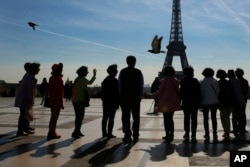Cities are places where action on climate change can have most impact because they are engines for innovation and also highly vulnerable to a warming planet, the head of the U.N. climate program said on Thursday.
More than 140 countries have ratified the Paris agreement on climate change and they are looking for leadership from cities to help them implement commitments their national governments made, Patricia Espinosa, executive secretary of the U.N. Framework Convention on Climate Change (UNFCCC) said.
“As each country looks to meet their emissions reduction, energy efficiency or renewable energy goals, they will look to cities as places where transformational change can make the most difference,” Espinosa told a conference on urban resilience in Bonn.
She said cities have a big responsibility in tackling climate change not only because they are large contributors to environmentally harmful greenhouse gas emissions but they also have potential to deliver prosperity and economic opportunity.
“Climate action in cities is the key that unlocks a low emissions and resilient future,” she said.
Climate change risks will become even more pressing as around two-thirds of people are predicted to live in cities by 2050, with developing countries in particular poised to see their urban populations soar.
"Cities should welcome a transformation to sustainable development because cities are uniquely vulnerable," said Espinosa.
Local action and educating citizens about climate change will be key drivers in reaching the goal agreed under the Paris deal — in effect since last year — to keep global warming to well below 2 degrees Celsius above pre-industrial levels, she said.
“It is on the ground in the real world where everything comes together,” Espinosa said.
She cited data that shows more than two thirds of the world's largest cities are in coastal regions, making their citizens vulnerable to sea level rises, flooding and other extreme weather.
“The risk to cities from climate impacts carries great social and economic cost, and of course, the loss of human lives,” said Espinosa.
“The ability of communities to meet their most basic needs — food, water, energy, sanitation — is threatened by climate change.”
These risks will not only affect cities in the developing world, she stressed, citing the impact of Hurricane Sandy in New York and the fact that flooding in Europe has more than doubled in the past 35 years.






